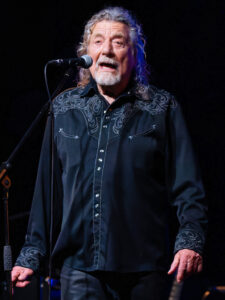Robert Plant in the 1990s: Evolution, Roots, and Reflections
By the 1990s, Robert Plant, the legendary frontman of Led Zeppelin, had long since transitioned from his towering rock god image of the 1970s to a mature, multifaceted solo artist. In his forties, Plant was no longer the lion-maned shaman of heavy blues rock, but an artist deeply engaged in exploration—culturally, musically, and personally. The decade marked a period of evolution, both inward and outward, as Plant balanced the weight of his Led Zeppelin legacy with a desire to chart new creative territory.
One of the most significant musical milestones for Plant in the 1990s came with the release of Fate of Nations in 1993. The album was a bold, textured work that fused folk, world music, and rock—serving as a testament to Plant’s refusal to remain stagnant. Tracks like “29 Palms” and “Calling to You” displayed both lyrical introspection and expansive sonic ambition. With contributions from musicians like Richard Thompson and Nigel Kennedy, the record reflected a maturing artist not afraid to question his past or reach for new ground.
Beyond the music, Plant’s deep ties to the West Midlands—particularly around his birthplace of West Bromwich and his family home in Kidderminster—remained central to his identity. Though he toured widely and was often based in London or abroad, he frequently returned to the rolling hills and close-knit communities of his youth. It was in these familiar surroundings that Plant remained grounded, reconnecting with old friends, family, and the unassuming landscapes that had shaped his worldview.

His parents, Annie Celia Plant and Robert C. Plant, were still living in Kidderminster for part of the 1990s, maintaining a quiet life removed from their son’s immense public profile. Plant often credited them with giving him both the discipline and the dream. His father, a World War II veteran and a civil engineer by trade, had instilled in Robert a strong work ethic and respect for structure—though the younger Plant often took a more bohemian path. His mother, of Romani descent, brought music into the household with her deep love of singing and storytelling. Her cultural heritage would later influence Plant’s interest in world music and lyrical mysticism.
Plant spoke warmly of his upbringing in various interviews during the 1990s, reflecting on how the post-war era in the Midlands had shaped his earliest musical inclinations. Listening to Elvis Presley, Muddy Waters, and John Lee Hooker on the radio, he found an escape from the ordinary. Those early experiences, nurtured by supportive parents who didn’t discourage their son’s unusual ambitions, were pivotal in forming the voice that would later echo in arenas around the world.
Despite his fame, Plant remained resolutely private about his family life. Unlike many of his rock contemporaries who embraced the limelight, Plant often sidestepped media spectacle. During the 1990s, he continued to raise his family with relative discretion and maintained a strong connection to his children, even as he pursued an often demanding musical path. His family tragedies, including the earlier loss of his young son Karac in 1977, still echoed in his music and public demeanor, giving him a contemplative depth that surfaced in many of his later lyrics.

Toward the latter half of the 1990s, Plant briefly reunited with Led Zeppelin guitarist Jimmy Page for the Page and Plant project, which included the release of No Quarter: Unledded (1994) and Walking into Clarksdale (1998). These albums saw the duo reinterpret classic Zeppelin material with Middle Eastern orchestration and fresh arrangements. The endeavor was more than a nostalgic trip—it was a genuine attempt to reinterpret the past through a contemporary lens. Although these reunions stirred speculation of a full Led Zeppelin comeback, Plant was adamant about moving forward artistically.
Musically, spiritually, and personally, Robert Plant in the 1990s was a man at peace with his legend but unwilling to be defined by it. He stood as an artist committed to reinvention, shaped by early experiences and anchored by his familial and regional roots. Whether singing on global stages or wandering the hills of Worcestershire, Plant carried with him the lessons of the past and the promise of the future. His enduring connection to the Midlands was more than nostalgia—it was a vital source of authenticity that informed everything he did.
In the end, the 1990s marked a decade of self-definition for Plant—not as the voice of Led Zeppelin, but as Robert Plant, the individual: thoughtful, experimental, and deeply human.













